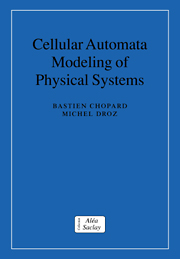Preface
Published online by Cambridge University Press: 26 October 2009
Summary
The cellular automata approach and the related modeling techniques are powerful methods to describe, understand and simulate the behavior of complex systems. The aim of this book is to provide a pedagogical and self-contained introduction to this field and also to introduce recent developments. Our main goal is to present the fundamental theoretical concepts necessary for a researcher to address advanced applications in physics and other scientific areas.
In particular, this book discusses the use of cellular automata in the framework of equilibrium and nonequilibrium statistical physics and in application-oriented problems. The basic ideas and concepts are illustrated on simple examples so as to highlight the method. A selected bibliography is provided in order to guide the reader through this expanding field.
Several relevant domains of application have been mentioned only through references to the bibliography, or are treated superficially. This is not because we feel these topics are less important but, rather, because a somewhat subjective selection was necessary according to the scope of the book. Nevertheless, we think that the topics we have covered are significant enough to give a fair idea of how the cellular automata technique may be applied to other systems.
This book is written for researchers and students working in statistical physics, solid state physics, chemical physics and computer science, and anyone interested in modeling complex systems. A glossary is included to give a definition of several technical terms that are frequently used throughout the text. At the end of the first six chapters, a selection of problems is given.
- Type
- Chapter
- Information
- Cellular Automata Modeling of Physical Systems , pp. xi - xiiPublisher: Cambridge University PressPrint publication year: 1998

